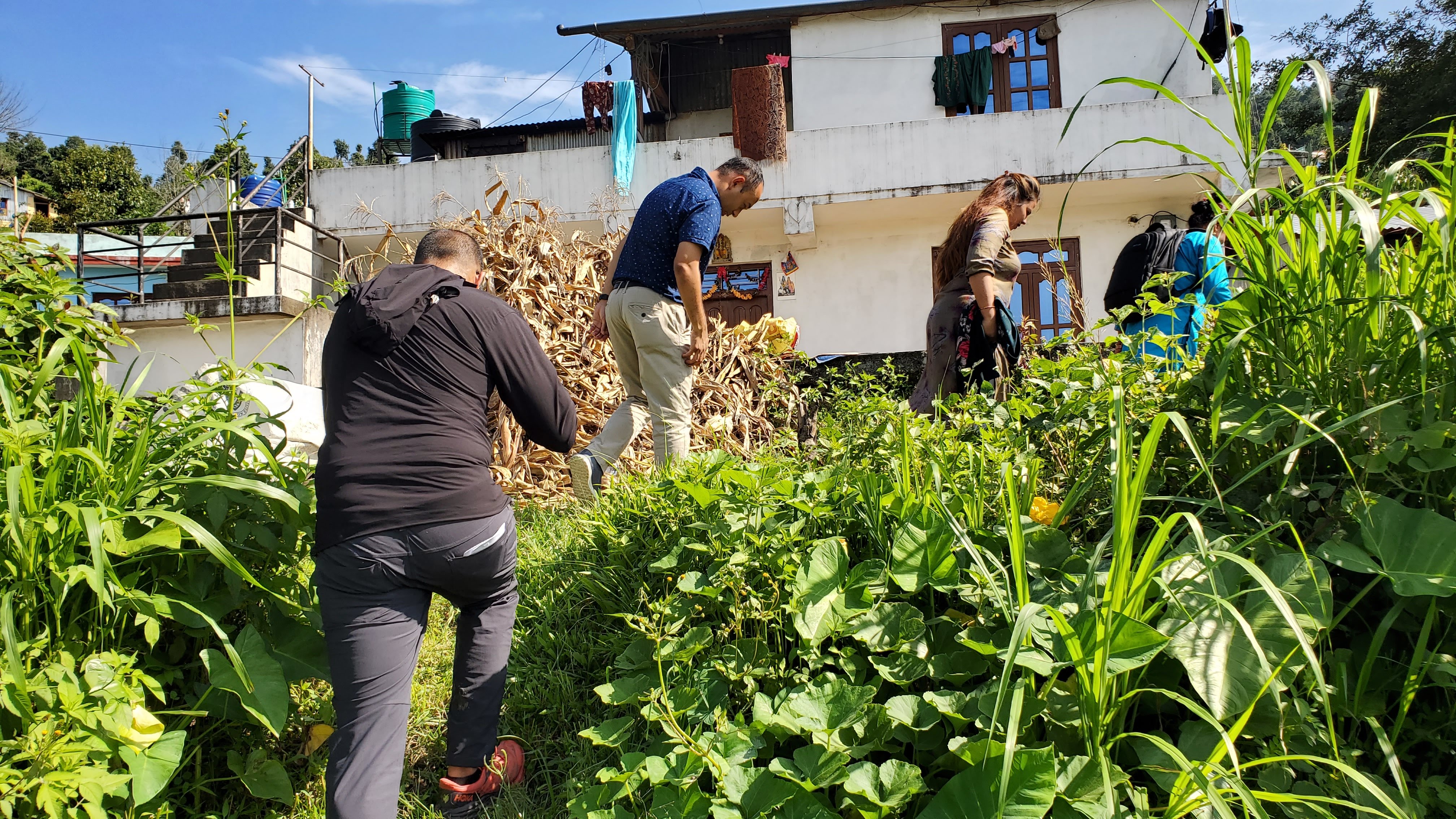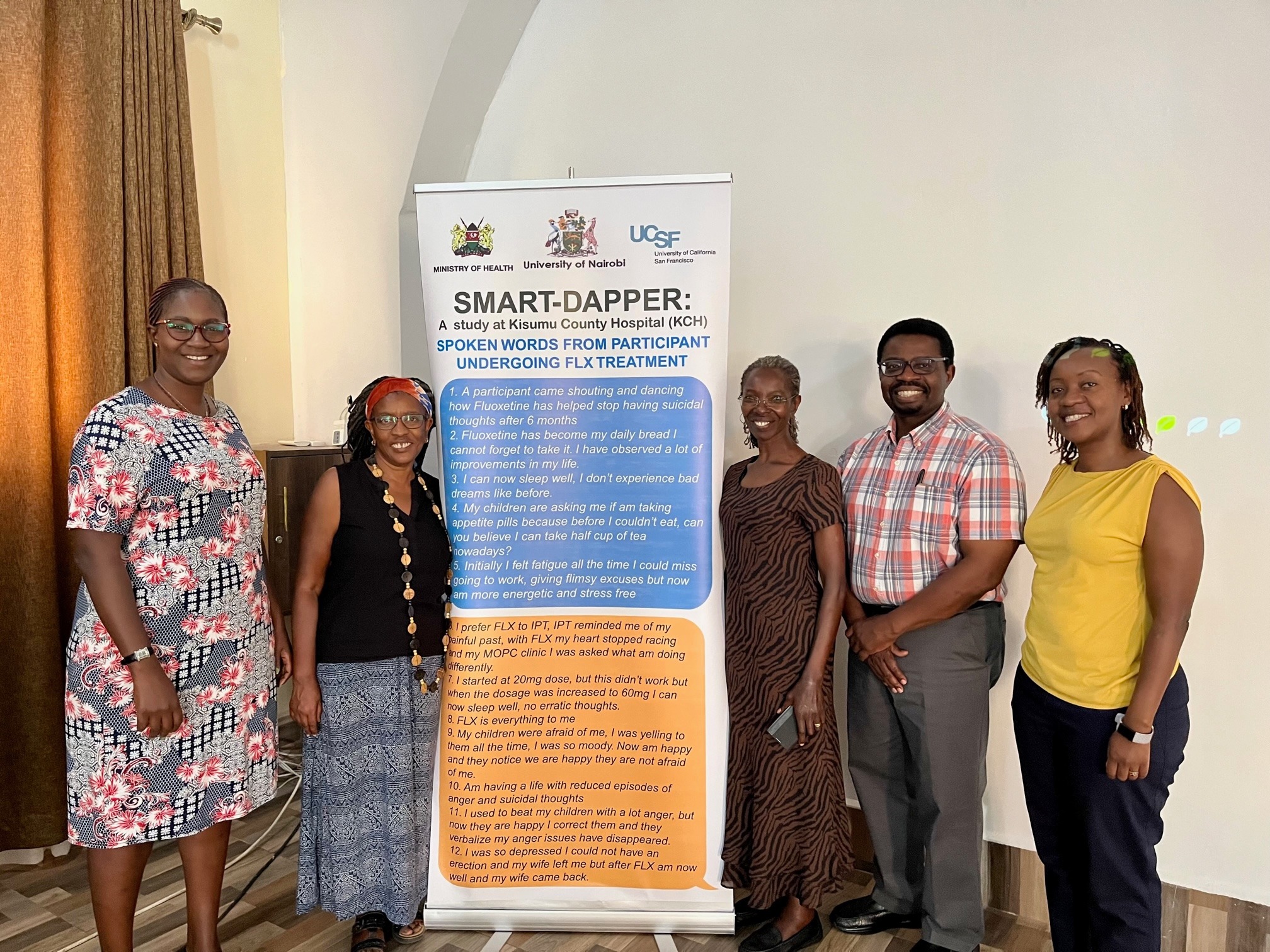
In the U.S., with six in ten psychologists reporting they do not have openings for new patients, there is clearly a gap in mental healthcare professionals. However, that void is even wider in Lower to Middle Income Countries (LMICs). A 2020 study in Focus: The Journal of Lifelong Learning in Psychiatry reported that, while the treatment gap in North America is at around 65%, the gap reaches closer to 90% in lower-income countries. It is precisely the vast gap in services in LMICs that drive some University of California (UC) faculty and researchers in their work to expand access to mental health services across the world.
We talked with researchers and practitioners across the UC doing this vital work to improve, expand, and advocate for quality mental health services in global settings.
UC San Francisco SMART DAPPER Study
In the Western Kenyan region of Kisumu, Principal Investigators, Susan Meffert, MD, MPH, professor of psychiatry at UCSF and Muthoni Mathai, MB, ChB, MMed, PhD, associate professor of psychiatry at the University of Nairobi are working with a team to study and expand access to evidence-based psychiatric care that can be replicated in other similar settings. The SMART (Sequential, Multiple Assigned Randomized Trial) DAPPER (Depressional and Primary-Care Partnership for Effectiveness-Implementation Research Project) trial funded by the National Institutes of Health involves screening public sector primary care patients. While awaiting primary care treatment, interested patients were consented and screened for Major Depression and/or Post-Traumatic Stress Disorder (PTSD). Eligibility criteria were kept minimal to approximate "real-world" conditions, and interested patients were randomized to receive either medication (fluoxetine/prozac) or talk therapy, if they meet all the inclusion criteria for the study.
The major component of the study involves Dr. Mathai and Dr. Meffert’s team of trained non-specialists, specifically general nurses and clinical officers who did not have specialized mental health training. “In order to treat these patients,” says Dr. Mathai, “the focus has been on training in very specific interventions like in what so called task sharing, training other cadres who may not be specialized in mental health.”
“We wanted to push the envelope,” says Dr. Meffert, “so we decided to test an SSRI [selective serotonin reuptake inhibitor]–used to treat depression and PTSD–that is widely available. And we continue the interpersonal psychotherapy (IPT) [study] arm–using both as first line treatment, which are even more powerful when they're combined than either alone.”
While the team is collecting follow-up data, they have already seen a high success rate and more participants in remission than expected. One exciting result is that there was roughly a 15% increase in income of participants from the 30 months they participated in treatment. Total, the study enrolled and randomized 2,162 participants between September 1, 2020 and October 15, 2021 and participants followed their 30 months of treatment upon enrollment.
“Mental health is still underfunded,” says Dr. Muthoni, “There is always a need to work in the community and increase awareness of mental health as a treatable condition.” But the successes of SMART DAPPER show that these results can be replicated. In fact, says Dr. Meffert, “there’s no excuse not to scale it up, especially if we look at the economic findings.”

HEAL Psychiatry Fellowship in Global Health
As part of the UCGHI Center for Health Workforce Equity, the Health, Equity, Action & Leadership (HEAL) Initiative is doing important work to expand global mental health access through the HEAL Psychiatry Fellowship. Program director for the Global Mental Health HEAL fellowship and associate professor in psychiatry at UCSF, Bibhav Acharya, MD, saw a need to include a specific pathway for psychiatry where it was not just an added element to the program, but the concentration for specific Fellows.
“It's a systems building, capacity building training program,” says Dr. Acharya. “The goal is to train psychiatrists and other healthcare providers in either improving or building mental health systems in places where it's hard to get access.” Through a two-week training, biweekly meetings and lectures, and one-on-one mentorship, the fellows are working with the support of the HEAL team to implement innovative mental health interventions with communities in Mexico, Nepal, and the Navajo Nation.
Fellow, Erika Valtierra-Gutiérrez, who earned her master’s degree in counseling at Universidad Iberoamericana, is in her second year of the Fellowship and her fourth year with Compañeros En Salud in Chiapas, Mexico. She is implementing an innovative training program for community mental health workers (C(M)HWs) from nine different clinics in mental healthcare in a community setting who facilitate group therapy sessions called “Trust Circles” with local women based on a year-long training the clinic staff took on restorative practices & conflict management.
“Women in these villages don’t have public spaces to hang out,” says Valtierra-Gutiérrez. “These trust circles are not only to be with each other in public space but also to talk about things that are not usually mentioned at home.” In addition to the group meetings, the C(M)HWs are also focusing on individual mental healthcare for people living with depression, anxiety, and other expressions of trauma. The community health workers whose training in trauma-informed care, often working with women experiencing gender-based violence, led them to co-create discussion topics with the women and helped create the supportive environment of the spaces. “We started adding more bottom up intervention, supervised more exercises focusing on the body and emotional regulation,” says Gutiérrez. “These CHWs are working gender-based violence cases on their many expressions,” says Valtierra-Gutiérrez, “and that this not only comes from evidence-based interventions but also from their local knowledge and lived experience.”
In Nepal, Shailesh Prasad Shrestha, MD, the clinical chief at the Dolakha Hospital says he found the fellowship because of how neglected mental health is in Nepal. “It's there but people don't want to talk about it. There's a lot of stigma.” He is two months into the fellowship, with a psychiatrist also stationed at the clinic, he has a goal to strengthen mental healthcare delivery by way of general practitioners in the clinic through training. Dr. Shrestha has already seen a notable difference in how clinical staff talk about mental health. “They’re talking a lot about their own mental health, they're talking with their friends, and there are more patients visiting our center because the word has gone out that there's a psychiatrist who is visiting our hospital.”
UC Davis Global Mental Health Track
The UC Davis Global Mental Health Track, is centered around global health mentorship focused on medical residents. “The purpose of the program is to provide residents an experience in global mental health that includes work in other countries, as well as with immigrant refugee populations in the US,” says program director, Ladson Hinton, MD. These experiences give residents the opportunity to dedicate time to dig into service- and research-based endeavors.
Third-year resident Amy Yordduangjun, MD, is working on a project in Thailand to provide mental health interventions for Thai medical students which stems from work she did in the U.S. with U.S. medical students. “The exchange of ideas and healthcare policies in my time in Thailand has broadened my understanding of ways we can improve and apply innovative ideas that other countries have implemented in our own practices,” she says. Another resident, Raiaan Ullah, MD, says “I believe mental health training should include broad-based perspectives on culture-bound psychic and behavioral phenomena.” As such, he started his work in Bangladesh getting a sense of the landscape of mental health needs for the lesbian, gay, bisexual, trans, queer-plus (LGBTQ+) community in the broader Bangladeshi native and diaspora communities.
Dr. Hinton believes strongly in cultivating a space for global mental health education and medical service. “Everything is global, even in the United States,” he says. “We've tried to put our emphasis [on marginalized communities in LMIC because of the] tremendous disparities and access and in the professional workforce in many of the countries throughout the world.”
The UC’s Impact on Global Mental Health
These initiatives are a snapshot of the impressive impact of the UC's on global mental health. In fact, HEAL's Dr. Acharya has been involved in numerous studies around mental health in Nepal, including this study funded by the National Institute of Mental Health to deliver mental health services in a primary care setting in rural Nepal, where their adapted version of the collaborative care model was found to be as effective as clinical trials in the United States.
Additionally, distinguished professor of psychology and anthropology at UC San Diego Janis Jenkens, PhD, teaches the UC Online course Global Mental Health, which is part of the suite of UCGHI’s Global Health Education courses, laying the groundwork for even more global mental health learners and advocates within the UC system. Additionally, the UC San Diego Center for Global Mental Health is doing exceptional work to expand research and advocacy for the field.
It is inspiring to see the diverse and important work around global mental health being done around the University of California. Individually these programs are impressive, but collectively, it is clear to see the larger impact the University of California system is having on creating greater and higher-quality access to mental health services worldwide.
